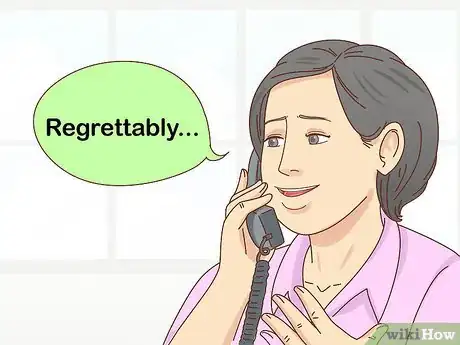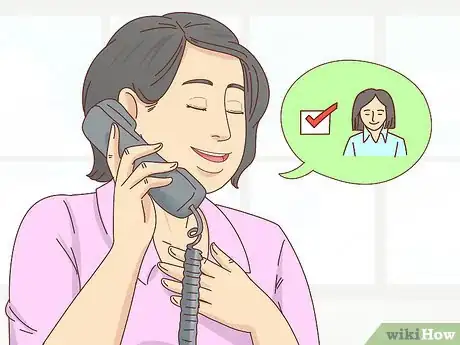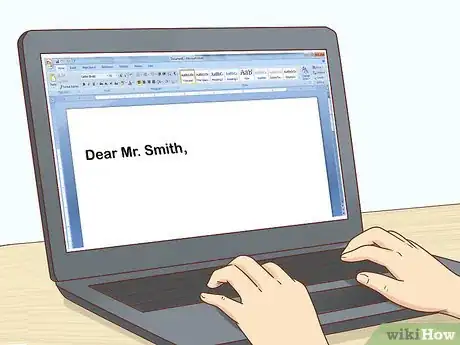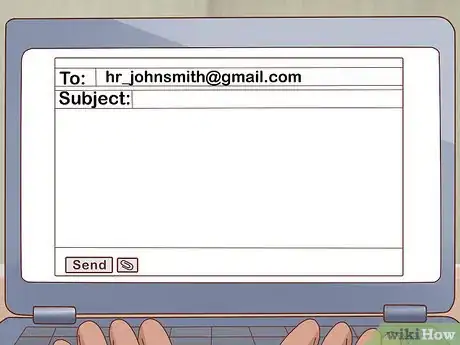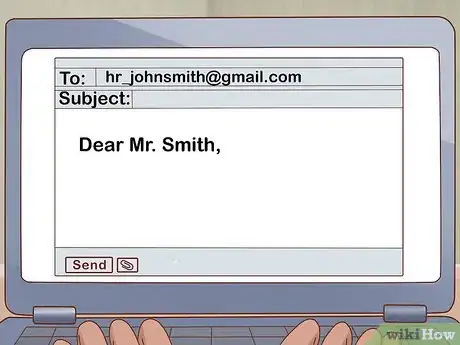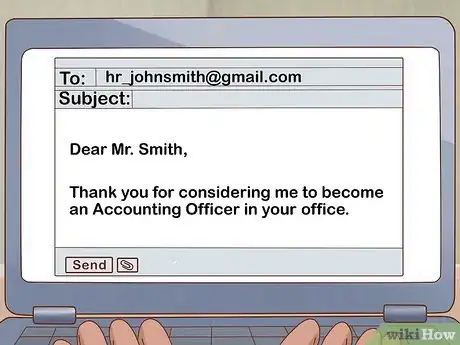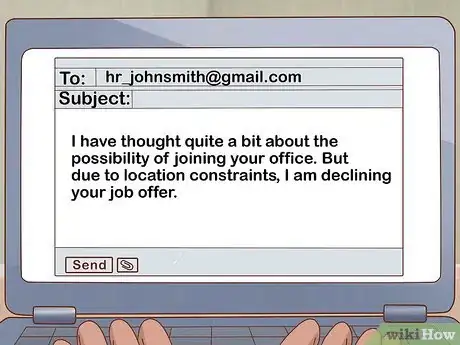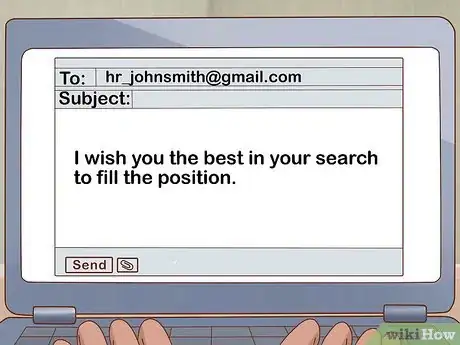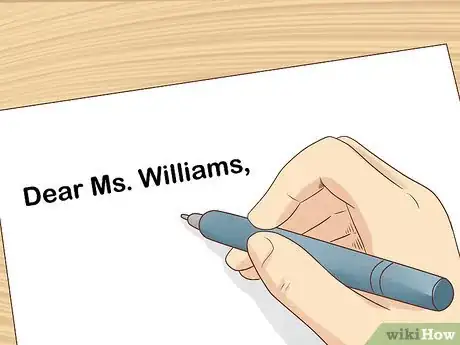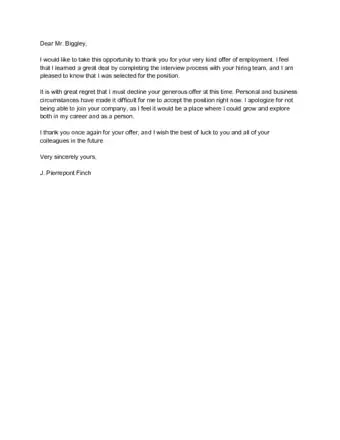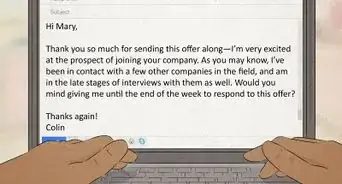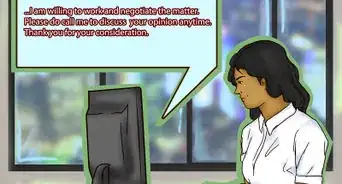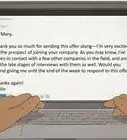This article was co-authored by Jonathan Soormaghen. Jonathan Soormaghen is a Career Coach and Founder of Resume Advisor, a career counseling firm that specializes in creating personalized products such as resumes, CVs, cover letters, and online branding tools to propel clients toward their next career milestone. Jonathan holds a BA in Political Economy from the University of California, Berkeley, where he was honored to serve as the Valedictory speaker of general commencement. Prior to founding Resume Advisor, he worked in management consulting and finance at companies including Accenture, Target, and Ernst & Young. Jonathan's clients have landed job offers from leading firms including Netflix, Google, Microsoft, Amazon, Facebook, Apple, Uber, Deloitte, KMPG, Accenture, and Merrill Lynch.
This article has been viewed 745,473 times.
It's important to be graceful and courteous when you decline a job offer. You want to keep your options open, avoid burning bridges, and leave a great impression all at the same time. Declining a job offer can be a little uncomfortable, but it's easy if you do it the right way.
Steps
Sample Email
Declining a Job Offer Over the Phone
-
1Call promptly. As soon as you know you won't be able to accept the position, make the call. The longer you delay, the longer it will take for your potential employers to hire another candidate. You're already rejecting your potential employers, so the least you can do is be as efficient as possible.
- As soon as you've accepted another position or have realized that the job will be impossible for you to take because of the compensation, responsibilities, commute, work environment, or whatever reason, place the call.[1]
- You should call the hiring officer or recruiter who made you the offer. If the are unavailable, avoid leaving your declination on their voicemail. Instead, leave a brief, upbeat message letting them know you are calling in regards to the job offer and asking them to return your call at their earliest convenience.
-
2Be thankful first. Before you reject the job offer, take the time to show the company how much you appreciate the offer and how hard they worked to make you feel comfortable at the company, to show you around and introduce you to people, or whatever else they did.[2] It's important to leave a good impression, as you never know when you'll cross paths with the employer again. You want to avoid ruining any future job opportunities.[3]
- Thank not only the person you're calling, but try to name a few people in the company who were also helpful to you.
- Use a few nice adjectives to describe the people or person who interviewed you. You can say the person was kind, thoughtful, welcoming, professional, or whatever works best for the situation.
- Don't overdo it. You don't have to spend an hour thanking the person over the phone—2 or 3 sentences will do. Cut to the chase.
- Maintain the right tone. Though you are complimenting the company, it should start to become obvious that you are not calling to deliver good news. Don't sound so enthusiastic that the person will be genuinely shocked to hear you won't be taking the offer.
Advertisement -
3Reject the offer. After you've thanked the person, clearly state, in no uncertain terms, that you will not be accepting the offer. You can start off by saying, "Regrettably..." or "Unfortunately..." before you deliver the bad news. Then you can briefly state a reason for why you chose not to accept the offer.
- Be diplomatic. You don't have to be completely honest if you are feeling negative. Treat this person as a future potential employer, and state everything as politely as possible.
- Speak clearly and steadily. Though you may be rushing to get off the phone, you should sound clear and confident when you deliver the message.
- You don't have to go into detail. For example, if you just got a bad vibe when you visited the office, or if you realized the position was completely beneath you, you can just say, "The job did not meet my career objectives." You can also say that the job did not suit your needs.
- If you got another job offer, great. That will make the whole process a little easier. Just say that you found another position that better suits your needs, or which is more aligned with your career objectives.
- Stress that this was a tough decision to make, and that you really wish it could have worked. Don't make it sound like you don't care about the company at all.
- Maintain a sincere and even tone. Show the person that you really do regret the decision.[4]
-
4Answer any questions you are asked. It's likely that you're not off the hook yet. After you make it clear that you're rejecting the job, you may be asked some more questions about your decision-making process. The employer may want to know why you're declining their offer so they can remain a competitive employer within their given job market.
- Be polite and professional. Even if you feel like you're getting grilled and are dying to get off the phone, answer the questions with the level of specificity you want to use.
- Give your full attention. Even if you're feeling uncomfortable or calling during a busy time, listen to the person completely to show that you still care and that the company should think of you in the future.
- Be courteous. Maintain a positive and complimentary tone, no matter what you are saying. Be honest without divulging too much information.
- Don't offend the company. If the benefits package was just not enough for you, for example, don't say the company was "cheap."
-
5Finish with grace. Once you have made your goal and have answered every question you were asked, it's time to get off the phone. After all, the hiring officer on the other end has to go try to find someone else to fill your potential position, so ending the conversation will benefit both of you.
- Again, thank the person for their time and effort.
- End with a small compliment. Remind the person that you were impressed with the company.
- Wish the person and the company luck in all of their future endeavors.
-
6Follow up in writing. Once you've hung up the phone, the worst is over. But to complete the process, you should still follow up with a letter to the person who tendered the offer.
- This will make you look even more responsible and professional.
Declining a Job Offer in Writing
-
1Write promptly. As soon as you know you won't take the offer, you should write your letter or email. Though a phone call may come first, in some more casual environments, starting off with a letter is acceptable as well.[5]
-
2Have a concise and polite opening. Simply saying "Dear Mr. Smith" is perfectly acceptable.
-
3Be thankful. The first sentence or 2 you write should thank the person for offering you the position you were offered, and for being so kind and courteous to you.[6]
- Remember to write in a professional manner. Don't be informal or overly chatty.
-
4State your reasons for declining the offer. You can just say the position didn't suit your needs, or that you found another position that aligns more with your objectives.[7]
- You don't have to be as thorough in writing as you would over the phone. You can just state your reasons in a sentence. If you're writing an email, you can be even more concise. Your letter should be no longer than 2 short paragraphs.
-
5Wish the person luck. Wish the person and the company the best of luck. It's important to be polite because you may be looking for work with that company in the future.
-
6Proofread your work. Take the time to read over what you've written to make sure it clearly communicates your points and is free of errors. Even if you're not taking the job, you should look like a meticulous and thoughtful person.
- If your letter or email is filled with errors, you will look careless.
Declining a Job Offer in Person
-
1Be honest.[8] If you are given a job offer on the spot and know that there is no way that you can take it, state that it does not meet your needs or objectives. Though it's more rare for you to be immediately hired, it can happen.[9]
- Don't lie about why you are not taking the position. You can omit information, but don't offer untruths. You should keep your credibility intact when you explain that you have decided not to take the position.
- If you're pretty sure that you won't take the position but not 100% sure, say that you will be in touch as soon as you make a decision. This is perfectly acceptable.
- If you know you won't be able to take it but feel too much pressure on the spot, ask for more time and follow up over the phone or in writing.
-
2Maintain appropriate body language. While you're delivering the bad news, maintain eye contact, don't slouch, and don't fold your hands across your chest. Look regretful, but comfortable, not like you're squirming to get out of there.
-
3Explain why you're rejecting the offer. Tell the potential employer why you won't accept the position in the same way you would do over the phone. Be diplomatic, concise, and courteous.
- Speak slowly and clearly so you don't have to repeat yourself.
-
4End on a good note. Shake hands with the person who made the offer and wish them and their company the best of luck. Walk out of the office with good posture and take measured steps to show that you're not trying to run out of there.[10]
-
5Follow up in writing. Writing a quick letter or email restating how thankful you are will make you appear even more courteous.
Sample Letter Declining Job Offer
Expert Q&A
Did you know you can get expert answers for this article?
Unlock expert answers by supporting wikiHow
-
QuestionWhat details should I include when declining a job offer?
 Jonathan SoormaghenJonathan Soormaghen is a Career Coach and Founder of Resume Advisor, a career counseling firm that specializes in creating personalized products such as resumes, CVs, cover letters, and online branding tools to propel clients toward their next career milestone. Jonathan holds a BA in Political Economy from the University of California, Berkeley, where he was honored to serve as the Valedictory speaker of general commencement. Prior to founding Resume Advisor, he worked in management consulting and finance at companies including Accenture, Target, and Ernst & Young. Jonathan's clients have landed job offers from leading firms including Netflix, Google, Microsoft, Amazon, Facebook, Apple, Uber, Deloitte, KMPG, Accenture, and Merrill Lynch.
Jonathan SoormaghenJonathan Soormaghen is a Career Coach and Founder of Resume Advisor, a career counseling firm that specializes in creating personalized products such as resumes, CVs, cover letters, and online branding tools to propel clients toward their next career milestone. Jonathan holds a BA in Political Economy from the University of California, Berkeley, where he was honored to serve as the Valedictory speaker of general commencement. Prior to founding Resume Advisor, he worked in management consulting and finance at companies including Accenture, Target, and Ernst & Young. Jonathan's clients have landed job offers from leading firms including Netflix, Google, Microsoft, Amazon, Facebook, Apple, Uber, Deloitte, KMPG, Accenture, and Merrill Lynch.
Career Coach You want to keep things positive. First off, you want to immediately thank them and express gratitude for presenting you an offer and believing in you. In rejecting their offer, just be honest and let them know that it was a very tough decision. If applicable, let them know that you decided to go with another other option but you definitely would love to stay in touch. That's really all you need to say.
You want to keep things positive. First off, you want to immediately thank them and express gratitude for presenting you an offer and believing in you. In rejecting their offer, just be honest and let them know that it was a very tough decision. If applicable, let them know that you decided to go with another other option but you definitely would love to stay in touch. That's really all you need to say.
Warnings
- Never make a negative remark about a business or employee when declining a job offer.⧼thumbs_response⧽
- Don't burn any bridges by neglecting to formally decline a job offer. There is no guarantee that a future job will work out for you or a new employer. If it turns out that it doesn't, then you may have to return to your former option, which means reapplying for that position.⧼thumbs_response⧽
References
- ↑ https://www.thecut.com/article/how-to-decline-a-job-offer.html
- ↑ Jonathan Soormaghen. Career Coach. Expert Interview. 7 October 2020.
- ↑ https://www.themuse.com/advice/how-to-gracefully-turn-down-a-job-offer
- ↑ https://www.businessinsider.com/how-to-turn-down-a-job-offer-2015-4
- ↑ http://career-advice.monster.com/resumes-cover-letters/cover-letter-samples/sample-letter-declining-job-offer/article.aspx
- ↑ Jonathan Soormaghen. Career Coach. Expert Interview. 7 October 2020.
- ↑ Jonathan Soormaghen. Career Coach. Expert Interview. 7 October 2020.
- ↑ Jonathan Soormaghen. Career Coach. Expert Interview. 7 October 2020.
- ↑ http://www.forbes.com/sites/jacquelynsmith/2012/08/13/how-to-turn-down-a-job-offer/2/
- ↑ Jonathan Soormaghen. Career Coach. Expert Interview. 7 October 2020.
About This Article
If you need to decline a job offer, call or email the employer as soon as you can so they have enough time to hire another candidate. Start by thanking them sincerely for their time, naming specific people who helped you in the application process. Then, clearly say that you won’t be accepting the offer, and briefly explain your reason. For example, if you got another job offer, simply say that you found another position that’s more aligned with your career objectives. Stress that the decision was a tough one to make, and avoid saying negative things about the employer. Once you’ve made your decision clear and answered any questions you are asked, finish by thanking the person again for their time and wrap up the conversation. For more tips from our Life Coach co-author, like how to decline a job offer in writing or in person, keep reading!




